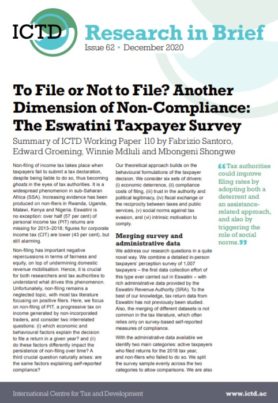Research in Brief 62
Non-filing of income tax takes place when taxpayers fail to submit a tax declaration, despite being liable to do so, thus becoming ghosts in the eyes of tax authorities. It is a widespread phenomenon in sub-Saharan Africa (SSA). Increasing evidence has been produced on non-filers in Rwanda, Uganda, Malawi, Kenya and Nigeria. Eswatini is no exception: over half (57 per cent) of personal income tax (PIT) returns are missing for 2013–2018; figures for corporate income tax (CIT) are lower (43 per cent), but still alarming. Non-filing has important negative repercussions in terms of fairness and equity, on top of undermining domestic revenue mobilisation. Hence, it is crucial for both researchers and tax authorities to understand what drives this phenomenon. Unfortunately, non-filing remains a neglected topic, with most tax literature focusing on positive filers. Here, we focus on non-filing of PIT, a progressive tax on income generated by non-incorporated traders, and consider two interrelated questions: (i) which economic and behavioural factors explain the decision to file a return in a given year? and (ii) do these factors differently impact the persistence of non-filing over time? A third crucial question naturally arises: are the same factors explaining self-reported compliance? Our theoretical approach builds on the behavioural formulations of the taxpayer decision. We consider six sets of drivers: (i) economic deterrence, (ii) compliance costs of filing, (iii) trust in the authority and political legitimacy, (iv) fiscal exchange or the reciprocity between taxes and public services, (v) social norms against tax evasion, and (vi) intrinsic motivation to comply. Summary of ICTD Working Paper 110 by Fabrizio Santoro, Edward Groening, Winnie Mdluli and Mbongeni Shongwe.
